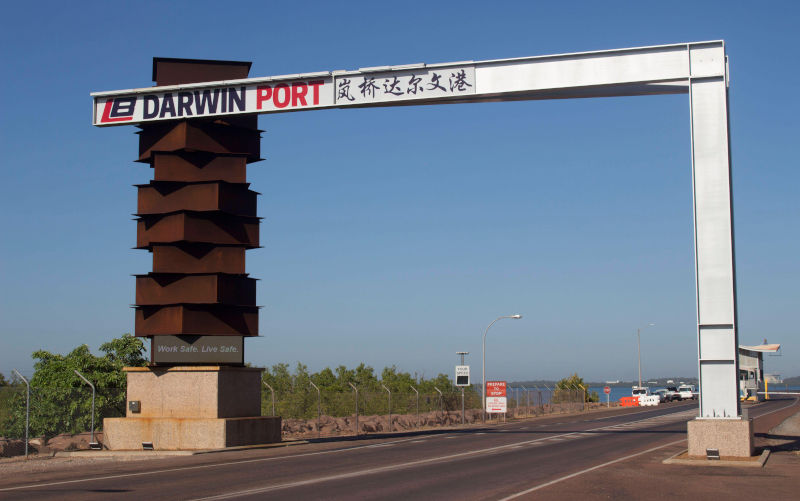Reports on the financial distress of Landbridge, the Chinese-owned company with a 99-year lease for the Port of Darwin, lack perspective and analysis. Penny Wong goes soft on China and ASPI goes unchecked.
Is the Port of Darwin on the chopping block?
No need to hold your breath, we’ll dispose of Victorian LNP Senator James Paterson at the top of this week’s column. There’s a reason major parties shove certain candidates onto Senate tickets. First, as a reward for their skills in playing factions and the party machinery; second, it spares the rigours of sticking their face in front of voters in electorates lest they be subject to serious scrutiny.
Paterson seems to have a sway over the media that far extends his sway over voters, most of whom would be clueless as to his existence.
Media reports on the possible forced sale of the Port of Darwin have got lots of people in the anti-China space very excited, none more so than Senator Paterson. The port is owned by Landbridge, a subsidiary of Chinese company Shandong Landbridge Group. The parent is in financial distress, having defaulted on loans and looking to pay down debt through the sale of assets. Landbridge says the Port of Darwin is not one of them.
Paterson has been a vocal critic of the sale, which was approved by his LNP government in 2015. His contradictory statements in the same Sky News interview (04 March) reveal him to be an opportunist of no substance and reveal Sky News as a network with no ability, nor desire, to put its guests to the test.
Paterson told Sky, “I really hope these media reports are right that the Albanese Government is about to do a massive backflip on the eve of an election and finally accept that it is not in our national interests for the Port of Darwin to be controlled by a company linked to a foreign authoritarian government.”
It’s been reported in the media that Landbridge is looking to offload the lease for more than $1 billion after having paid just $506 million a decade ago. To that, Paterson said, “This is a company that’s in distress, this is a company that needs to sell, and we’ve got the whip hand here, the Australian Government. So, the Albanese Government should seize that opportunity and secure the Port of Darwin back on very good commercial terms.”
Without being challenged, Paterson seamlessly transitioned from the assertion that the Port of Darwin is a strategic asset of national importance held by an aggressive foreign power, to it being a commercial holding of a company looking to extract the best price.
For a decade, the mainstream media has pushed the barrow that Landbridge’s ownership is a potential national security threat. In that time, there’s not been one incident to support that assertion, yet barely a peep from the media.
The glaringly obvious question is, if the port was of great strategic importance to the Chinese Government, why on earth would it allow Landbridge to sell it?
It appears the Landbridge situation has not materially altered in the past five months when news broke of potential problems for the company in the face of Shandong Landbridge Group’s debt restructuring. Landbridge non-executive director, Terry O’Connor told the ABC (04 March), “It’s a federal election time, and we’ve seen this thrown up the last federal election before it.
“We become a political football [that] gets kicked around for a number of months, and we’ll probably get kicked around after the election.” Kudos to the ABC for including that grab in its report.
The same Sky news story that ran the Paterson grabs had the LNP’s Matt “Old King Coal” Canavan saying, “When we see Chinese ships circumnavigating our country in an aggressive fashion firing off missiles, should we really have our ports in the hands of that government?” It is abundantly clear that no missiles were fired from the decks of the three Chinese ships conducting exercises in internation waters. Canavan should have been immediately picked up on that.
Penny Wong’s weakness
The Australian Financial Review’s analysis (05 March) of, Foreign Minister Penny Wong’s appearance at a conference sponsored by the paper complained, “The foreign minister missed an opportunity to be firm about the challenges from Beijing and the US, and Australia’s defence.”
The AFR told readers, “Wong downplayed China’s naval power play so close to Australia’s shores. She said that although Australia would give more notice of naval exercises, China was operating in the same way that our navy conducts naval activities in the South China Sea.
“The difference, of course, is that Australia has a national security interest in protecting shipping routes in the South China Sea. The openness and freedom of this vital international waterway have been threatened by China’s attempts to assert control and ownership of islands, reefs and shoals in that region.”
There was a time when AFR readers could think for themselves. How on earth can the protection of shipping lanes in the South China Sea be of strategic importance to Australia and not to China? It’s nonsense being peddled off to the readership as serous analysis. If the Chinese Government spent as much time lying awake at night worrying about Australia as the Australian media does about China, I say let’s get the AUKUS subs here in double-quick time.
A bolt from the blue
What’s Sky News after dark without some China bashing and what better corner to get in than that of the Australian Strategic Policy Institute. Senior analyst Malcolm Davis was wheeled out (07 March) by Andrew Bolt, preaching to the converted.
Davis told Bolt that Donald Trump’s foreign policy, of what he says is appeasement towards Vladimir Putin, is facilitating greater Chinese aggression as it marches off to war over Taiwan. Three years ago, it was the mainstream Western media, enabled by groups like ASPI, advancing the idea that non-appeasement was pushing an emboldened China off to war with Taiwan. Which is it?
And what would an ASPI interview on Sky be without Davis likening Trump’s foreign policy towards Russia with, British prime minister Neville Chamberlain’s appeasement of Nazi Germany?
Meanwhile ASPI research director Danielle Cave told the Wall Street Journal (27 February) that the think-tank is in dire straits over the Trump Administration’s decision to cut US Aid and funding associated with foreign propaganda outfits such as ASPI. The WSJ, once a publication of record, now under Murdoch ownership, might just as well have lifted copy (maybe it did ) straight out of an ASPI news release.
Cave was quoted as saying, “Like many NGOs, we’re waiting to hear whether this [China] work will proceed in the months to come. In the meantime, we’re looking for alternative support and staff have been moved to other projects where possible.”
ASPI is not an NGO (non-governmental organisation). While NGOs can receive government funding and preserve their status, ASPI is incorporated as a Commonwealth company, wholly owned by the Australian Government. Millions of dollars of its government funding is tied to delivering commercial services to government departments; calling itself an NGO is just propaganda to paint itself as a victim.
It’s yet another case where a mainstream media report permits blatant ASPI talking points to go unchallenged. The simple reason is that journalists relying on ASPI are not looking for proper analysis, rather “expert commentary” to support largely Sinophobic narratives.
The views expressed are solely those of the author and may or may not reflect those of Pearls and Irritations.
Marcus Reubenstein is an independent journalist with more than twenty-five years of media experience, having previously been a staffer with a federal Liberal Party senator from 1992 to 1994. He spent five years at Seven News in Sydney and seven years at SBS World News where he was a senior correspondent. As a print journalist he has contributed to most of Australia’s major news outlets. Internationally he has worked on assignments for CNN, Eurosport and the Olympic Games Broadcasting Service. He is the founder and editor of Asian business new website, APAC Business Review.

